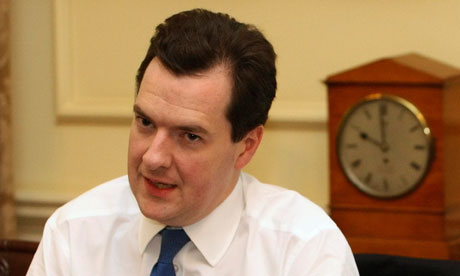
Budget 2010: Income tax removed for lowest paid

The chancellor, George Osborne, is to promise that tomorrow's deficit-busting emergency budget will hit the richest 10% hardest and take 850,000 of the lowest paid out of income tax altogether.
Osborne will announce a £200 tax cut for 20 million basic rate taxpayers in an attempt to show that the toughest budget in a generation is "tough but fair". His aides claim Osborne has consciously learned from the mistaken austerity budgets of the 1980s, which did not do enough to distribute the pain fairly.
Tomorrow's announcement raising the personal income tax allowance by £1,000 to £7,475, at a cost of £3.7bn, is also being billed as the start of a staged drive to meet the coalition's long-term objective – and a key Liberal Democrat policy – of raising personal allowances to £10,000. Those on higher incomes would not benefit from the tax break, and would have their tax thresholds lowered to leave them no better off.
The business secretary, Vince Cable, has been the chief architect of the scheme to increase personal allowances as a way of injecting greater fairness into the tax system. It appears Cable's aides are willing to see a VAT rise tomorrow to help pay for the reforms.
The Treasury refused to say if it was planning to raise VAT, but the shadow chancellor, Alistair Darling, said he would be astonished if Osborne did not push it up from 17.5% to 20%. The cost of the personal allowances could alternatively be funded through a proposed levy on bank profits.
Osborne will also announce that he will not add to the already enormous capital spending cuts that Labour had earmarked in the March budget, another victory for Cable. Despite speculation that the Treasury would demand even deeper cuts in infrastructure projects such as roads and railways, Osborne will agree that capital spending increases should come down from 3% of GDP in 2009-10 to 1.25% by 2013-14. Osborne will also tomorrow publish detailed tables designed to show the distributional impact of the tax changes, and that the impact is broadly flat across income groups. "The chancellor is keen to show that everyone will make a contribution to reducing the deficit," one Osborne aide said. "But the richest will pay more, both in absolute terms and as a percentage of their income."
Osborne is expected to claim that 80% of the reduction of the structural deficit will be achieved by spending cuts and 20% by tax rises. He will also assert that the measures announced tomorrow will make it possible to eliminate the structural deficit by the end of the parliament.
The coalition will go into the budget with cautious public support for its programme of immediate cuts, according to a Guardian/ICM poll. It shows that 59% of voters back cuts even if they lead to worse public services. Although 63% agree that the poor will suffer the most from the budget, only 22% think that people should be asked to pay more in tax.
In a sign of the pressures on the public sector, Sir Gus O'Donnell, the cabinet secretary, told chairs of public sector bodies tonight that they faced significant challenges after the budget. "If you think it's been tough to now, you ain't seen nothing yet."
The Lib Dems are especially aware that spending cuts in some departments of over 15%, a near-two-year freeze in public sector pay, higher jobless forecasts and early reductions in welfare benefits will combine to shock many of the party's traditional supporters.
In a sign of the nerves inside the Lib Dem high command, Nick Clegg today emailed all party members. "Cuts must come. We have taken the difficult decisions with care, and with fairness at their heart. You will see the stamp of our Liberal Democrat values in tomorrow's budget. But nonetheless, it will be controversial. This is one of the hardest things we will ever have to do, but I assure you, the alternative is worse".
Osborne's aides openly admitted the chancellor was keen to draw a contrast with Tory budgets of the 1980s, which were heavily skewed in favour of the better-off. Research by the Institute for Fiscal Studies has shown that anybody in the top half of the income scale did better under the Tories from 1979 to 1997, while those in the bottom half did better under Labour from 1997 to 2010.
Ed Balls, a candidate for the Labour leadership, said: "If George Osborne tries to buy off the Liberal Democrats by raising personal allowances but at the same time puts up VAT the result will be deeply unfair, not only hurting low-income families but also pensioners and the unemployed, who don't pay income tax."
Osborne is also expected to curtail a benefits such as tax credits for the better-off. An autumn spending review will set out details of where the departmental axe will fall, but it will be possible to tell the scale of the coming cuts tomorrow.
www.guardian.co.uk/uk/2010/jun/21/budget-2010-income-tax-removed-lowest-paid
